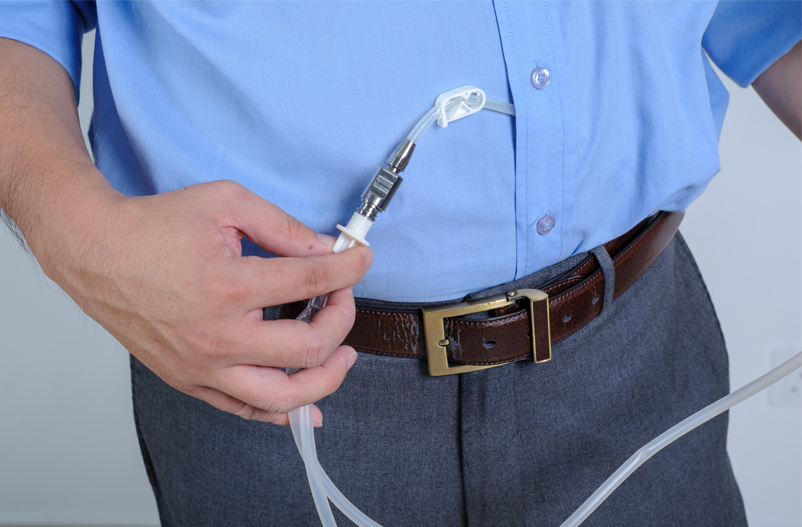Peritoneal Dialysis
Peritoneal dialysis, or PD, is currently the most common home dialysis treatment option. Among nephrologists (kidney doctors) worldwide, it is considered the most recommended initial and long-term therapy. PD is generally performed every day, either manually during the day or at night, with the help of a cycler machine.

How PD works
When the kidneys cannot filter out toxins and fluid buildup in the body, the person will undergo dialysis treatment to remove waste materials from the body. PD uses your own abdomen (belly) lining to help remove the waste buildup. This is done with a solution known as dialysate. Instead of using needles, a surgically placed tube called a catheter is used to pass dialysate in and out of the abdomen. This soft and flexible catheter, approximately the width of a pencil, can be discreetly hidden under clothing while going about daily activities. The process involves the fluid drawing waste from the blood and exiting the body through the catheter over several hours. Since peritoneal dialysis (PD) treatments can be performed multiple times a day, it closely resembles the natural function of the kidneys. The catheter remains permanently in the abdomen and is secured outside the body with tape, allowing individuals to continue their everyday tasks such as work recreation, taking a shower, sexual activity, and exercise without interference.
Transitioning from in-center dialysis to PD
Many people starting with an in-center dialysis treatment might eventually switch to at-home dialysis treatment. You will have more freedom and flexibility during your dialysis treatment but will certainly not be alone.
You will be just one phone call away from our highly trained home dialysis clinical team members, who will dedicated to providing you with superior care and will make your dialysis experience as smooth as it can get.
Our on-call nurse is available 24/7, as is vendor support for your PD cycler.
To see if PD can be a suitable option for you, talk to your nephrologist or a care team member. To learn more about PD, read about the Benefits of Peritoneal Dialysis.
Care.
Convenience.
Freedom.
DCC is proud to offer the best quality home dialysis services to its patients.
Common Questions of Peritoneal Dialysis (PD)
Infections are more common with PD compared to other modality choices.
If you have an infection, it can be treated at home with antibiotics. You are also more likely to get a kidney transplant in the U.S. than to be at risk of peritonitis infection.
PD is very time-consuming.
PD may allow you to spend time with family and friends, at work, or do what you love the most – because, with this option, you can have dialysis treatment outside of a dialysis center.
PD is not a viable option for individuals who are overweight, muscular, or tall.
PD is mostly suited for patients with a larger body mass. Studies show that death and infection rates are similar for people with end-stage renal disease (ESRD) who have a raised body mass and are on PD than those on in-center hemodialysis (HD).
PD is not suitable for people who have disabilities.
Although PD may be more challenging for people with specific disabilities (blindness, deafness, amputation, etc.), this treatment may still be an option. Performing PD with the help of a care partner and/or specialized equipment is often feasible. Training and safety programs are available to provide education on safely and effectively performing treatments for the patient and their care partner.
PD is not an option for older people.
There are no age limitations for undergoing PD. Older individuals, as well as children, may be able to perform PD with the assistance of a care partner.
People on PD can’t own pets.
Pets cannot be in the room while performing PD, but you can still have them. Maintaining cleanliness in your home and the designated treatment area during PD is essential.
Benefits of Peritoneal Dialysis
PD gives you more control over your treatment and allows for a flexible schedule.
- You can administer your PD treatment yourself.
- PD can be done overnight using a machine (cycler) or manually during the day. The PD equipment can be conveniently delivered to your home.
- You do not require needles for PD.
PD allows you to pursue your interests more freely.
- With PD, you’ll have fewer trips to the dialysis center since it is done at home.
- PD may have fewer dietary restrictions, which can make you feel better.
Potential for a greater feeling of well-being
- There is less time needed for recovery between PD treatments.

